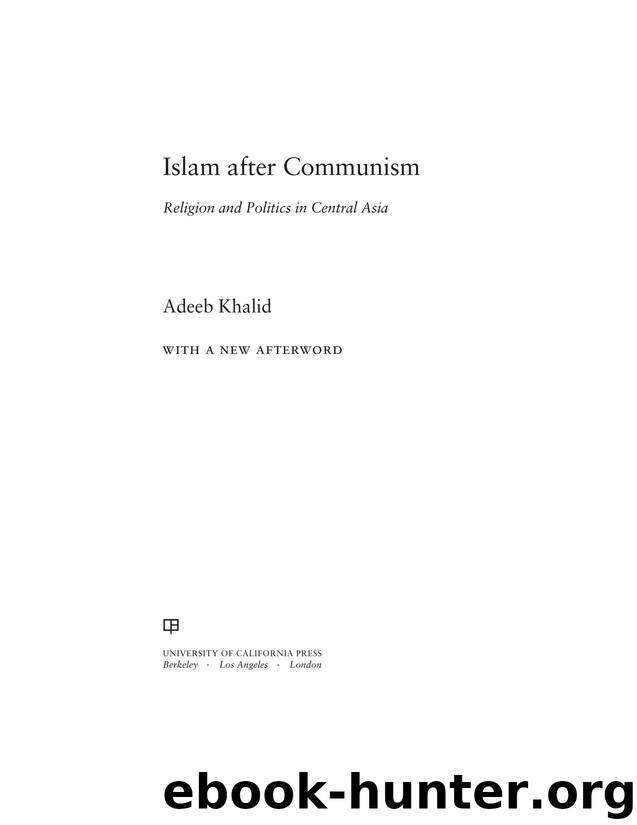Islam after Communism by Khalid Adeeb;

Author:Khalid, Adeeb;
Language: eng
Format: epub
Publisher: University of California Press
TABLE 3. RESULTS OF THE MARCH 1991 REFERENDUM ON PRESERVING THE UNION
Central Asian Party leaders also supported the attempted putsch against Gorbachev in August 1991. Only when the plan failed did they hastily turn to independence, cashing in on their status as national leaders to declare their republics independent of Moscow. They retained their grip on power, which was threatened by a democratized reconstitution of the Soviet Union, by claiming it in the name of the nation. Western observers had expected nationalism to liberate the various nations of the Soviet Union from the Communist regime. Instead, nationalism became the vehicle for the Communist Party elites to retain their power. Communist apparatchiki, all of whom had risen to power only recently, suddenly became founding fathers of new national states.
• • •
Central Asia inherited not just the Soviet economy and Soviet institutions but also the Soviet legal system, policing structures, and many social and official attitudes about power, politics, and the relationship between state and society. There has also been a marked continuity in the personnel who staff the institutions of power. More significantly, the networks of power, the so-called clans that took control of political and economic resources in the Soviet period, have not been dislodged from their position. Indeed, the postindependence trajectories of Central Asian states make little sense except in the context of the politics of these networks and their machinations to retain control of resources and exclude others from it. The patterns of recruitment into government service or into positions of control over the economy have not shifted dramatically. Central Asian states are run by the same elites today that were in power in the late Soviet period. Change in formal institutional structures is limited to the downgrading of the party-state, which was the conduit for the distribution of resources in the Soviet era. In the immediate aftermath of Soviet collapse, local branches of the Communist Party quickly renamed themselves, and many of them managed to stay in power as bearers of the will of the nation. But their function as a patronage machine is gone, and power has increasingly concentrated in the executive branch, which towers above all other aspects of state power.
One should not assume, however, that simply because the new regimes are corrupt, they are unpopular. All five regimes discussed above have banked on nationalism to acquire a substantial fund of legitimacy. They have all acted to “nationalize” their states—that is, to make the states ostensibly the instruments of the will of the nation, the nation being the ethnonational group from which each country takes its name. Each state presents itself as the result of centuries-long striving of its nation to unite and gain political independence, a process that was rudely interrupted by Russian conquest and then the continuation, ostensibly, of Russian rule under the Soviet guise. Although the details vary from country to country, in practical terms, nationalization of the state means the elevation of indigenous languages to official status at the expense of
Download
This site does not store any files on its server. We only index and link to content provided by other sites. Please contact the content providers to delete copyright contents if any and email us, we'll remove relevant links or contents immediately.
| Africa | Americas |
| Arctic & Antarctica | Asia |
| Australia & Oceania | Europe |
| Middle East | Russia |
| United States | World |
| Ancient Civilizations | Military |
| Historical Study & Educational Resources |
The Sympathizer by Viet Thanh Nguyen(4096)
The Rape of Nanking by Iris Chang(4024)
World without end by Ken Follett(3347)
Ants Among Elephants by Sujatha Gidla(3282)
Blood and Sand by Alex Von Tunzelmann(3060)
Japanese Design by Patricia J. Graham(3005)
City of Djinns: a year in Delhi by William Dalrymple(2438)
Foreign Devils on the Silk Road: The Search for the Lost Treasures of Central Asia by Peter Hopkirk(2389)
Inglorious Empire by Shashi Tharoor(2348)
The Queen of Nothing by Holly Black(2325)
In Order to Live: A North Korean Girl's Journey to Freedom by Yeonmi Park(2304)
India's Ancient Past by R.S. Sharma(2304)
Tokyo by Rob Goss(2295)
India's biggest cover-up by Dhar Anuj(2250)
Tokyo Geek's Guide: Manga, Anime, Gaming, Cosplay, Toys, Idols & More - The Ultimate Guide to Japan's Otaku Culture by Simone Gianni(2244)
The Great Game: On Secret Service in High Asia by Peter Hopkirk(2231)
Goodbye Madame Butterfly(2163)
Batik by Rudolf Smend(2010)
Living Silence in Burma by Christina Fink(1987)
